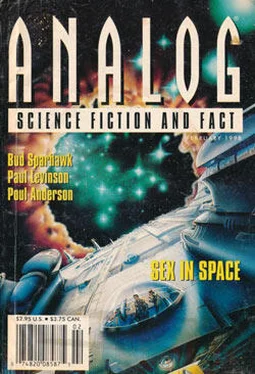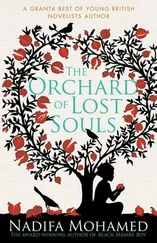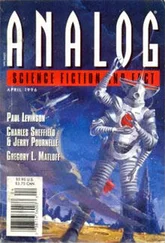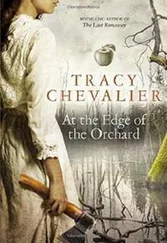Paul Levinson - The Orchard
Здесь есть возможность читать онлайн «Paul Levinson - The Orchard» весь текст электронной книги совершенно бесплатно (целиком полную версию без сокращений). В некоторых случаях можно слушать аудио, скачать через торрент в формате fb2 и присутствует краткое содержание. Год выпуска: 1998, Издательство: Dell Magazines, Жанр: Фантастика и фэнтези, на английском языке. Описание произведения, (предисловие) а так же отзывы посетителей доступны на портале библиотеки ЛибКат.
- Название:The Orchard
- Автор:
- Издательство:Dell Magazines
- Жанр:
- Год:1998
- ISBN:нет данных
- Рейтинг книги:4 / 5. Голосов: 1
-
Избранное:Добавить в избранное
- Отзывы:
-
Ваша оценка:
- 80
- 1
- 2
- 3
- 4
- 5
The Orchard: краткое содержание, описание и аннотация
Предлагаем к чтению аннотацию, описание, краткое содержание или предисловие (зависит от того, что написал сам автор книги «The Orchard»). Если вы не нашли необходимую информацию о книге — напишите в комментариях, мы постараемся отыскать её.
The Orchard — читать онлайн бесплатно полную книгу (весь текст) целиком
Ниже представлен текст книги, разбитый по страницам. Система сохранения места последней прочитанной страницы, позволяет с удобством читать онлайн бесплатно книгу «The Orchard», без необходимости каждый раз заново искать на чём Вы остановились. Поставьте закладку, и сможете в любой момент перейти на страницу, на которой закончили чтение.
Интервал:
Закладка:
The Orchard
by Paul Levinson

Illustration by Darryl Elliott
The wind blew through the fruiting trees on the hill. Branches sagged with their burden, scenting the air with invitation, attracting moths that flew and climbed and crawled and penetrated. Soft things fell to the ground, opening and oozing, calling forth more of the world around them.
It had been a long time since intelligence had set this in motion. Yet once there had been just a scraggly sapling or two on this bill, thin hints of things to come; later replaced by careful, deliberate rows of the bearers of luscious gifts. And after the initiation, intelligence had continued to tend this. Arranging with some logic the moldering leaves that fertilized the ground. Discouraging parasites, large and small, that would attack the trees, or plunder the fruit, dismember their beauty, before their time. The trees were bred to take countermeasures, take care of themselves…
And when the intelligence left, the trees carried on. More went fallow than under watchful eyes, a branch on this tree went a bit wild and choked out another. Thirty percent eventually died, twenty percent new growth sprung up in unordered places, but the trees carried on. As they had been intended to do. They had not the perception to miss their guardians, nor the capacity to do anything about it even if they had. But they continued. Fruiting for a quarter of their planet’s revolution around its star, leafy green the next half, barren in the wintry season. Fruiting, leafy, barren…
And one day, another flying thing came out of the sky…
The story of this expedition had been told long before the technology existed to make it possible. Humans achieved faster-than-light travel—artificial wormholes punctured Einstein’s conservatism about speed-of-light well before the end of the 21st century—and by the 22nd this had been developed into a more advanced “snake hole” system that could intelligently route a star craft just about anywhere within a 200-light-year radius from Earth. This newly accessible sea of stars and planets became to the human species what Earth itself, a sea of continents, had been since Magellan’s voyage in the 16th century. And the search for intelligent life was on.
Life it turned up aplenty. A bumper crop. Teeming, colorful, DNA-based, locomotive, photosynthetic, and more—the whole enchilada—but not a speck of it like anything humans would call humanly intelligent. The cognitive abilities of even chimps and dplphins were utterly lacking in the exo-phyla catalogued by the human teams dispatched to Earth-type planets around foreign suns.
And so the story of this expedition was old—another ship in search of the bright elusive butterfly of intelligence in the cosmos. Another team eager to award the appellation of human-level intelligence to some deserving species.
It was lonely at the top.
Deborah Sung-Lee was chief of the five-person first-skim team. Her specialty was cognitive exo-anthropology—anthropology having evolved to mean not just human but intelligent by this century, an odd linguistic turn considering that its new extended subject had yet to be discovered in reality. In truth it was more a hope than a description of a discipline.
The purpose of this first in-person encounter with the fifth planet of Beta Hydri was textbook tech-check: a thorough scan and sniff and sift of the planet’s land, air, and water for any sign of technology, any imprint of the peculiar kind of order that ran both counter and parallel to that of living structure. This meant a hunt for any perturbation of nature, even a discoloration of the soil that humans could take to be evidence of intelligent intervention in the course of things.
The first possible candidate she found was death.
Hers.
Martin Kendrick—exo-fossilist, Deborah’s lover, and now, by virtue of his seniority, first in command—stroked her face repeatedly, then moved his forefinger from his lips to hers, and whispered good-bye.
He turned to his colleagues. “The book says we get to vote, in these circumstances, whether to leave or continue working here,” he said, voice scratchy with emotion. “Your thoughts?”
“The problem, of course, is we don’t know why she died,” Pavel Chakravarty, the team’s DNA statistician, said. “So there’s some probability that we could all die trying to discover why.”
“Our directive is to look for intelligent life,” Jake Venza, macro-ecologist, countered. “Nothing takes precedence over that. Human death on an alien planet, while not unknown, is by definition unusual—it could be the result of alien intelligence. We didn’t ask anyone’s permission to land here. Maybe the locals got angry.”
“If there are locals here with any intelligence, so far they’ve been invisible,” Martin said quietly.
Pavel made a show of consulting his pad, even though he had memorized the relevant numbers. “Deborah’s is the 17th death out of 961 humans exploring worlds outside of our Solar System in the past 76 years. Seven were from natural causes, three from technological malfunction or accident, seven from local conditions—disease, predator, food initially judged to be edible turned out otherwise. Actually, that last sub-category can also be considered technological malfunction, at least in two cases. But, in any event, none of the seventeen were the result of any known alien intelligence at work. We have no reason to think that’s what’s going on here.”
“Not the point,” Jake said. “Of course we have no positive reason to conclude that Deborah was deliberately—or even accidentally—killed by some intelligence. But surely her death is more significant than nothing having happened here at all. Surely we’d be idiots not to take that into account.”
“We’re taking it into account right now,” Martin replied.
“Pavel, what do your figures show about our work intersections on the planet?” Susannah Ring asked. She was the not-unusual combination of medical officer and exo-botanist for the group.
Pavel looked at his pad in earnest this time, punching in some numbers. “OK, in the nearly fourteen earth-weeks we’ve been here on Beta Hydri 5, we’ve done sixty-seven different tasks outside, or the same tasks in different places. Minimum overlap for Deborah was two—she never performed a task alone, none of us do—and her average is 2.7. Her overlap on consumption of native food—leafy vegetables, tubers, stems, all tested as thoroughly compatible with human digestion, of course—is also right near the group mean, by the way. Deborah ingested nothing that at least two others of us haven’t also.”
“Not much help there,” Jake muttered.
“Well, no, that does suggest some sort of internal natural cause,” Pavel said. “And that assists us in knowing that this planet was likely not responsible for her death.”
“So why are you so eager to leave?” Jake shot back.
“I’m not eager, I—”
“That’s enough,” Martin interrupted. He looked at Susannah. “Your figures are likely the only ones that could really tell us something here,” he said.
Susannah sighed. “I can’t conjure up answers where there are none. Her heart stopped, sometime in the middle of the night, apparently when she and we were all sound asleep. She hadn’t performed any kind of dangerous, even stressful work before. She was apparently in perfect health, so she wasn’t hooked up to any night monitors—which would have woken me immediately when her heart stopped.”
“Well, we’re not making that mistake again,” Martin said.
Читать дальшеИнтервал:
Закладка:
Похожие книги на «The Orchard»
Представляем Вашему вниманию похожие книги на «The Orchard» списком для выбора. Мы отобрали схожую по названию и смыслу литературу в надежде предоставить читателям больше вариантов отыскать новые, интересные, ещё непрочитанные произведения.
Обсуждение, отзывы о книге «The Orchard» и просто собственные мнения читателей. Оставьте ваши комментарии, напишите, что Вы думаете о произведении, его смысле или главных героях. Укажите что конкретно понравилось, а что нет, и почему Вы так считаете.












